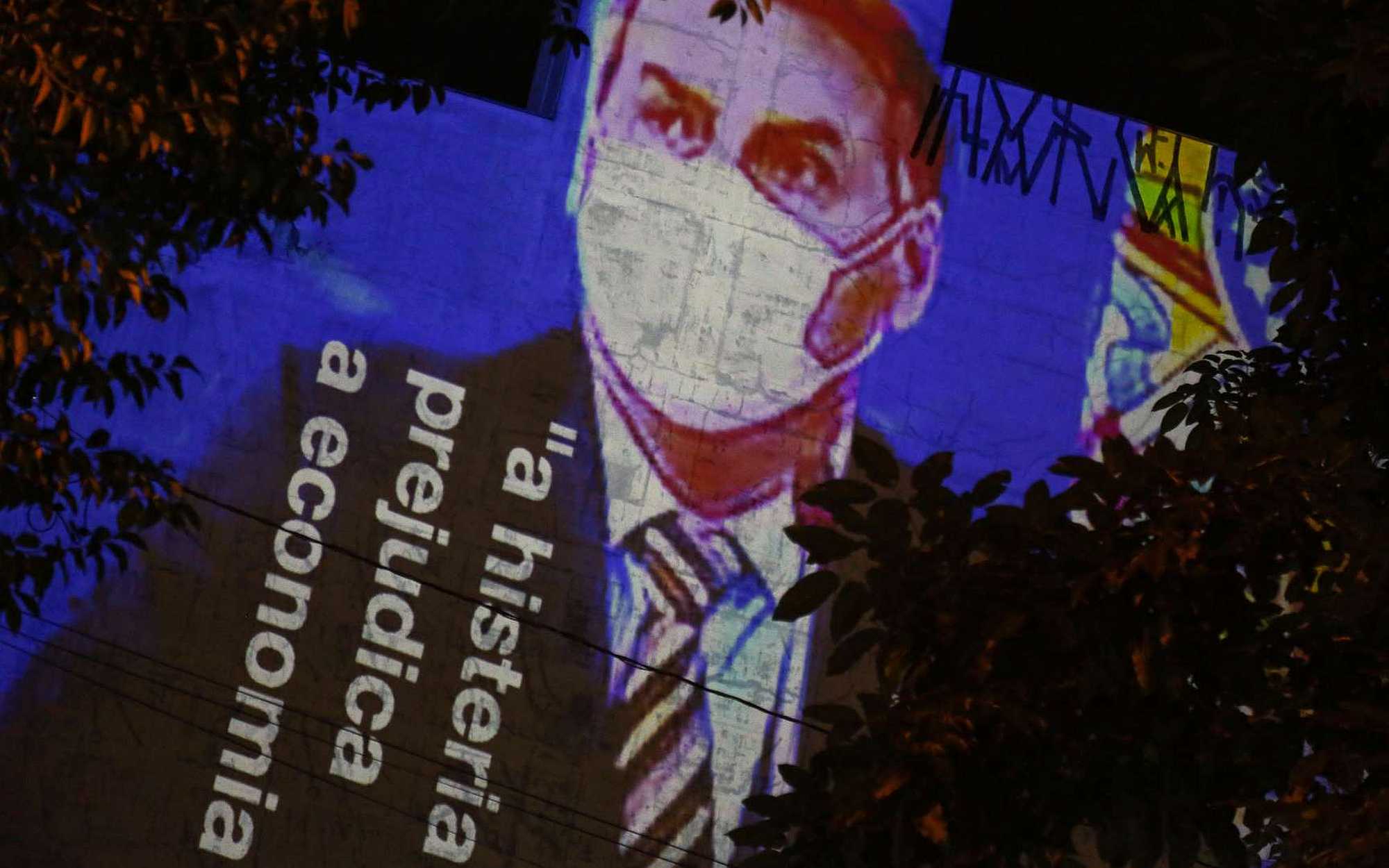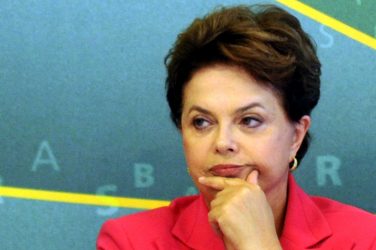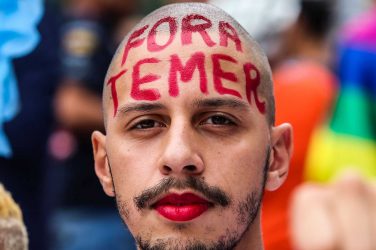Brazilian President Jair Bolsonaro blasted as criminals the governors and mayors of Brazil’s largest states and cities for imposing lockdowns to slow the coronavirus outbreak, as tensions with his health minister simmered. The death toll rose to 114 from 92 while confirmed cases rose to 3,904 from 3,417 the day before.
Bolsonaro has aligned himself with U.S. President Donald Trump in prioritizing the economy over the shutdowns favored by public health experts – including his own health minister Luiz Henrique Mandetta – who have warned the outbreak in Brazil could trigger a collapse of the healthcare system next month.
“Other viruses have killed many more than this one and there wasn’t all this commotion,” Bolsonaro told journalists. “What a few mayors and governors are doing is a crime. They’re destroying Brazil.” Bolsonaro said he fears violent social uprisings as happened in Chile since last October, if the economy remains frozen.
As his boss downplayed the virus, national security adviser Augusto Heleno on ignored medical advice to self-isolate for two weeks, instead returning to work just seven days into his quarantine after a positive coronavirus test. Heleno also attended cabinet meetings on the day he was waiting for the test result.
In opposing shutdowns in Brazil’s biggest cities and states, Bolsonaro has cast himself against local officials, congressional leadership, in addition to his health minister.
He also played down the threat of the virus, assuring Brazilians that “90% of us will have no symptoms if contaminated” and his “history as an athlete” meant he personally would suffer at most “a little flu.”
Senate President Davi Alcolumbre denounced his speech and called for “leadership that is serious, responsible and committed to the life and health of its people.”
São Paulo Governor, João Doria, took Bolsonaro to task for not setting an example for Brazilians and appealed for him to “lead the nation, not divide it” at a time of crisis.
The country’s top medical associations issued statements in support of Mandetta’s approach to dealing with the epidemic, amid fears that the minister might resign from the job.
At a news conference, Mandetta, who denied that he was quitting, stressed the gravity of the epidemic and the need to keep up the drive to isolate the population from the virus.
Demand for electricity, a strong indicator of economic activity, fell sharply at the start of the week in Brazil, according to the National Electricity System Operator.
The agricultural sector, a powerhouse of the Brazilian economy, also said it was suffering due to the coronavirus, with farm lobby CNA warning that grain, coffee and sugarcane growers were facing operational hurdles.
Still, the Economy Ministry said it will not sacrifice long-term debt targets in order to rescue the economy. An official said there was no capacity for huge fiscal packages to fight the coronavirus crisis.
Economic Policy Secretary Adolfo Sachsida said any additional measures would only apply for this year, but warned that fiscal stability in coming years cannot be put at risk by overspending in 2020.
The government is struggling to transport medical equipment due to widespread flight cancellations, health minister Mandetta said, forcing authorities to rely on ground transportation.
Mandetta said the ministry would allow doctors to use the anti-malarial drug chloroquine to treat coronavirus. The drug, described by Trump as a potential “game changer,” has not yet been proven effective against the new coronavirus.
A lead doctor on clinical trials in Brazil for the related drug hydroxychloroquine said that initial results would only be available in two weeks.
Bolsonaro and Governors Clash
Governors pressed Bolsonaro for more federal support in the coronavirus battle after he blasted them as job-killers and undermined their orders with a decree keeping churches open at evangelical preachers’ request.
“This wave of panic and hysteria is bigger than the virus itself,” he said on a Facebook Live broadcast.
But Bolsonaro did lobby for a subsidy for Brazil’s poorest that was passed by the lower chamber of Congress. The subsidy is meant for informal workers and small business people and amounts to 600 reais (US$ 119.46) per month for three months. The bill still requires Senate approval.
The amount was a significant increase over previous versions of the bill. The executive had initially pushed for only 200 reais before Bolsonaro modified his proposal.
In a public letter, Brazil’s governors argued that the federal government had not done enough to fund the fight against the virus.
In the state of Rio de Janeiro, which relies on dwindling oil tax revenue to keep public services running, Governor Wilson Witzel said he may have to loosen an order closing businesses if the federal government does not offer aid.
“The people will only accept confinement if they’re able to eat. Business leaders will only pause activity if they have conditions for financing,” Witzel underlined. “I can’t ask people to go hungry.”
The governors’ letter listed eight proposed measures for Bolsonaro to take, such as suspending state payments to the federal government and helping states buy medical equipment.
São Paulo Governor, João Doria, who campaigned alongside Bolsonaro in 2018 but has become one of his chief critics during the public health crisis, said he expected to see concrete federal aid measures implemented within 72 hours.
Bolsonaro is under growing pressure over his handling of the outbreak, which he initially labeled a “fantasy” and continues to characterize as “a little flu.”
Across cities, protesters have been banging pans in almost nightly protests, and Bolsonaro’s support is down in opinion polls, with Brazilians clearly favoring the governors’ response.
After Bolsonaro blasted some governors for the “crime” of shutting down businesses amid the outbreak, he undermined their efforts with a decree exempting churches from closure orders, heeding requests from evangelical leaders, an important constituency for the president.
In São Paulo, the country’s most populous state, which has been most stricken by the epidemic, Doria recommended that churches close their doors for 60 days.
Financial Bazooka to Avoid Depression
Brazil’s central bank could soon be forced to fire up the money printing presses if the coronavirus-fueled recession facing Latin America’s largest economy is as devastating as some economists fear.
Hopes for any growth this year have all but evaporated. Many observers expect Brazil’s US$ 1.8 trillion economy to post its first annual contraction since 2016. Some are predicting the biggest crash in decades, with a slide of up to 6%.
With President Jair Bolsonaro’s government keen to reduce a substantial deficit, it may fall to the central bank to fire the financial “bazooka” required to prevent recession from turning into depression, economists say.
That could mean taking a leaf out of major central banks’ post-2008 crisis playbook and embracing “quantitative easing,” or QE: buying government bonds with newly-created money to lower long-term interest rates and flooding the financial system with cash.
Brazil’s central bank President, Roberto Campos Neto, sidestepped the question, saying his preference was to provide the banking system with liquidity. With interest rates at 3.75%, there is room for more conventional action, but many economists see QE as increasingly likely.
“It will end up happening,” said Jose Francisco Gonçalves, chief economist at Banco Fator in São Paulo. “We’re going to do it. There’s no other way.”
“Campos Neto is extremely competent: he has a world view, and is aware of the consequences of the central bank’s actions. This could be his Mario Draghi moment,” Gonçalves said.
At the height of the euro zone crisis in July 2012, Mario Draghi, then president of the European Central Bank, uttered his now famous remark that the ECB would do “whatever it takes” to save the euro. It was the turning point of the crisis.
Leaders of the G20 group of rich nations echoed Draghi with a pledge to inject US$ 5 trillion in fiscal spending into the global economy and “do whatever it takes to overcome the pandemic.”
The ECB, U.S. Federal Reserve, Bank of England, and Bank of Japan have already pumped trillions into their financial systems, often leaning on deft legal and political guidance to overcome domestic opposition.
The central banks of Australia and New Zealand took their first forays into the world of QE and Israel’s central bank resumed bond-buying for the first time since 2009.
“It’s happening all around the world. It’s not just the big central banks like the Fed,” said Carlos Kawall, director at Asa bank in São Paulo and a former treasury secretary.
“I don’t see why we wouldn’t be doing that. It’s time to look for unconventional policies,” he said.
Like many central banks, Brazil’s is prevented by law from buying bonds at government debt auctions – so-called monetary financing – but is allowed to buy them on the secondary market to support money supply or monetary policy management.
Inflation is undershooting the central bank’s target and inflation expectations continue to decline, despite a 20% depreciation in the exchange rate this year.
A significant tightening of Brazilian financial conditions from plunging stock prices, a record low exchange rate and widening credit spreads has rung alarm bells for market stability and future growth prospects.
To be sure, the central bank has already shown itself to be flexible, under former trader Campos Neto’s guidance.
It has ramped up foreign exchange intervention, opened a bond “repurchase” program, and taken a range of steps to inject liquidity into the financial system to free up banks’ funds for lending and ease companies’ and individuals’ debt burdens.
In the bank’s own words, it has pledged to “deploy its arsenal of monetary, exchange rate and financial stability policies to fight the current crisis.”
Mercopress













